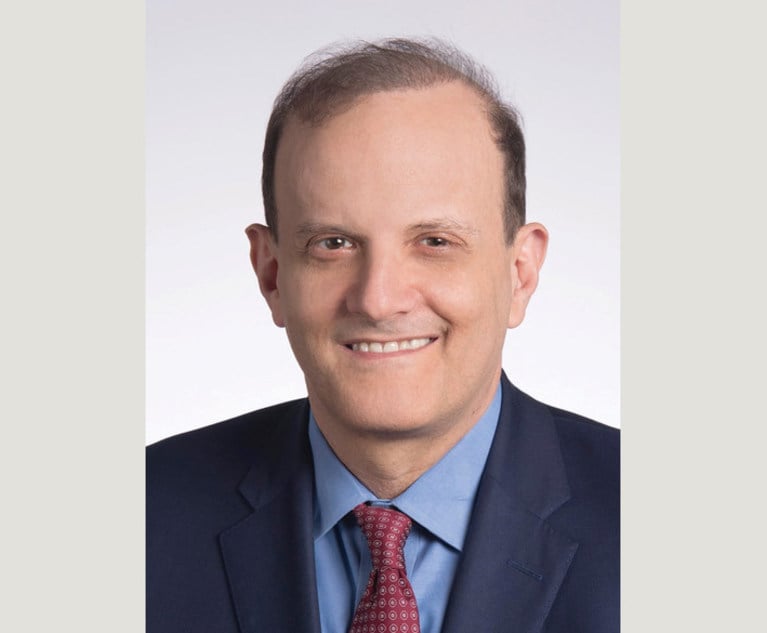 Jeffrey Campolongo.
Jeffrey Campolongo.EEOC Steps Up Enforcement of Illegal Leave Policies
What is the going rate for settling an illegal policy case, you ask? Well, based on two recent settlements obtained by the U.S. Equal Employment Opportunity Commission (EEOC), it appears to be about a million dollars.
July 25, 2018 at 03:23 PM
6 minute read
What is the going rate for settling an illegal policy case, you ask? Well, based on two recent settlements obtained by the U.S. Equal Employment Opportunity Commission (EEOC), it appears to be about a million dollars. In a lawsuit the EEOC brought against cosmetic company, Estée Lauder, the company agreed to pay $1.1 million to resolve a gender discrimination case. The lawsuit, which was filed by the EEOC in the Eastern District of Pennsylvania against the New York-based conglomerate, accused Estée Lauder of having an illegal policy which discriminated against male employees by giving them less paid parental leave than their female colleagues.
On the same day, the EEOC also announced the simultaneous filing and settlement of a disability discrimination lawsuit against a global metal goods manufacturer, Memphis-based Mueller Industries, Inc., which has agreed to pay $1 million and other injunctive relief. According to a press release, the EEOC charged that the company terminated employees or failed to provide reasonable accommodations for those exceeding its maximum 180-day leave policy. The EEOC also said that Mueller Industries violated federal law by implementing an attendance policy that assigned points to employees' absences, regardless of reason.
|Estée Lauder's Illegal Parental Lave Policy
According to the EEOC's suit, Estée Lauder provides four paid parental leave benefits to employees. The leave benefits consist of maternity leave, adoption leave, primary caregiver leave and secondary caregiver leave. Employees eligible for maternity, adoption and primary caregiver leave are entitled to six weeks of paid leave for “child bonding” purposes. The policy distinguished between biological mothers, who are entitled to the full six weeks of paid leave, and new fathers, who are deemed secondary caregivers, and only entitled to two weeks. The policy also provided female employees with “more flexible arrangements when they returned to work” than their male counterparts.
The illegal policy was brought into focus by Christopher Sullivan who was a stock worker at an Estée Lauder retail store in Maryland. Sullivan filed an EEOC charge alleging that he requested and was denied six weeks of paid leave in 2015 when his child was born. The company only provided Sullivan the option to take leave as a secondary caregiver and therefore relegated him to only two weeks of paid leave. After conciliation attempts failed at the EEOC, the suit was commenced in federal court alleging violations of Title VII and the Equal Pay Act, see EEOC v. Estee Lauder Companies, No. 2:17-cv-03897, (E.D. Pa).
The EEOC alleged in the suit that Estée Lauder's parental leave policy resulted in an unlawful denial of equal benefits and privileges of employment to Sullivan and a class of 210 similarly situated male employees who, as new fathers, received less child bonding benefits than female employees who were new mothers. The parties entered into a one-year consent decree. According to the settlement, in addition to the $1.1 million payment, Estée Lauder agreed to adjust its parental leave policy to ensure that new fathers have the same amount of paid time off as women. The company is also required to provide notice to all eligible employees of the revised policies and to provide training to supervisors and human resource professionals, subject to compliance monitoring by the EEOC.
Similar to the Estée Lauder suit, a male employee has filed an EEOC charge against JPMorgan Chase over its separate parental leave policy assigning “primary caregiver” and “secondary caregiver” status to males and females. According to the charge, Derek Rotondo worked as a fraud investigator in the Columbus, Ohio office of JPMorgan. He applied for primary caregiver status, which would entitle him to a very generous 16 weeks of paid leave, rather than the two weeks given to secondary caregivers. He was told that the company considers mothers to be primary caregivers and that to qualify, he would need to show that his wife had returned to work or was medically unable to take care of the child. Rotundo was unable to meet those criteria because his wife, who was a teacher, had not returned to work because the baby was just born in the summer. Rotondo's case is still pending before the EEOC and alleges classwide gender-based discrimination.
|Mueller Industries' Illegal 180-Day Leave Policy
The EEOC filed a lawsuit in the U.S. District Court for the Central District of California against Mueller Industries in EEOC v. Mueller Industries, No. 2:18-cv-05729-FW-GJS, (C.D. Ca.). The suit alleges the company discriminated against George Molina, Brandon Pickelhaupt, and a class of similarly aggrieved individuals due to their disabilities when Mueller Industries failed to excuse disability-related absences, or provide additional time off as a reasonable accommodation to individuals with disabilities, or individuals that were perceived as disabled that lead to their termination.
The company was alleged to have an illegal policy that automatically terminated employees for exceeding its maximum 180-day leave policy. The EEOC also said that Mueller Industries violated federal law by implementing an attendance policy that assigned points to employees' absences, regardless of reason. Similar issues were previously litigated in a case brought by the EEOC against UPS. In that case, the EEOC challenge the UPS policy of terminating employees who were unable to return to work after 12 months of leave on the grounds that such a policy constitutes an unlawful qualification standard under the ADA, see EEOC v. UPS, 2014 BL 35887, N.D. Ill., No. 1:09-cv-05291, Feb. 11, 2014).
In the Mueller Industries lawsuit, the parties entered into a two-and-one-half-year consent decree, providing for $1 million in compensation for a class of affected employees. In addition to the monetary relief, Mueller Industries agreed to provide reinstatement to the affected individuals; appoint an ADA coordinator; revise its written policies and procedures regarding its complaint procedure; create and maintain an accommodation log; post a notice for employees on the matter; implement training to all employees on the ADA; develop a centralized tracking system for accommodation requests; and submit annual reports to the EEOC verifying compliance with the decree.
The EEOC has always been at the forefront of combating illegal, discriminatory policies. The aforementioned cases are no different. While the million dollar settlements are encouraging, the nonmonetary relief and adjustments to the illegal policies is more impactful and inspiring.
Jeffrey Campolongo, founder of the Law Office of Jeffrey Campolongo, has been perfecting his brand of law for almost two decades, focusing on employment and entertainment matters.
This content has been archived. It is available through our partners, LexisNexis® and Bloomberg Law.
To view this content, please continue to their sites.
Not a Lexis Subscriber?
Subscribe Now
Not a Bloomberg Law Subscriber?
Subscribe Now
NOT FOR REPRINT
© 2025 ALM Global, LLC, All Rights Reserved. Request academic re-use from www.copyright.com. All other uses, submit a request to [email protected]. For more information visit Asset & Logo Licensing.
You Might Like
View All

Employment Law Developments to Expect From the Second Trump Administration
8 minute read
3rd Circuit Strikes Down NLRB’s Monetary Remedies for Fired Starbucks Workers

Trending Stories
- 1Decision of the Day: Uber Cannot Be Held Vicariously Liable for Driver's Alleged Negligent Conduct
- 2TikTok Law and TikTok Politics
- 3California Supreme Court Vacates Murder Conviction in Infant Abuse Case
- 4New York’s Proposed Legislation Restraining Transfer of Real Property
- 5Withers Hires Lawyers, Staff From LA Trusts and Estates Boutique
Featured Firms
Law Offices of Gary Martin Hays & Associates, P.C.
(470) 294-1674
Law Offices of Mark E. Salomone
(857) 444-6468
Smith & Hassler
(713) 739-1250





